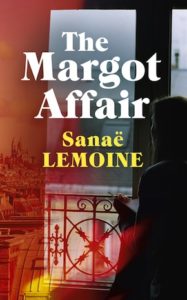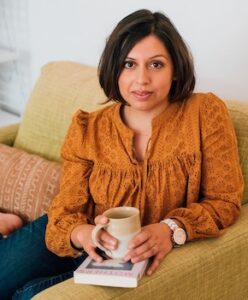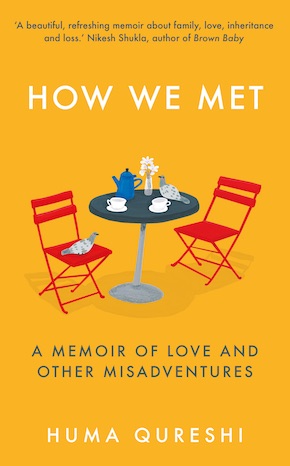All the love in the world
by Huma Qureshi“It is nice when two people come together in the universe,” Huma Qureshi remembers telling her young son in the opening pages of How We Met. He promptly asks how she and his dad Richard came to be together, and so begins Huma’s story of her quest for married love. It’s a short book – you’ll read it like a novella in one sitting – but don’t let its physical size determine the breadth and depth of what becomes a very big, multifaceted story covering family ties and freedom, tradition and culture, ambition and dreams, death and grief, growth and recovery, religion and belief, and finding Mr Right.
Huma brings her family, friends and suitors to life in a genuine romance with all its heartache and struggle, and it is deeply satisfying to read. She writes about the Islamic faith and how traditions have imposed constrictions difficult to live up to. She gives us an eye-opening glimpse into a white man’s conversion to Islam, and confesses to having the same surprise as the reader at how pure the religion is when you are given an opportunity to learn about what is at the very heart of its philosophy. It is the very opposite of what much of the media and the fundamentalists would have you believe…
Where are you now?
At home in north London suburbia with my husband and three children, trying to homeschool while also trying to write my next book.
How would you summarise your lockdown experience?
It has ebbed, flowed and overwhelmed. Some days it feels impossible to balance everything that must be balanced. Other days, my focus is hyper-sharp because it has to be, and there is no choice. But I feel my energy slipping away more and more in this lockdown, for sure. It’s not just related to work, it’s everything; it’s hard, not seeing people other than those who live with you. I miss that.
Where and when do you do most of your writing?
We moved house in one of the lockdowns, to an old sixties house which we plan to renovate. The extra space means I finally, after years, have a room of my own in which to write. The room was a horrible shade of grey when we moved in, with two layers of carpet laid down in 1960. We whitewashed the floorboards and painted the walls yellow – it’s a temporary fix but it means I have a corner of sunshine to myself. As for when I write, really it’s whenever I can, but it’s hard when there’s lessons going on and children who need my attention. In normal times, I wrote every day quite solidly. Though I am so grateful to have my family safe and well, I would still give anything to have that time back; to be able to think clearly.
If you have one, what is your pre-writing ritual?
A cup of hot tea and at least ten minutes of reading to mark the transition from crazy family life into quieter, writing life. Reading is like crossing a bridge into that other world, that other space, I need to be in in my head in order to begin.
Mostly it feels very urgent and intense… A small part of me is always aware that my time will forever be cut short by the end of the school day, and so when I write, it’s from a certain place of frenzy.”
Full-time or part-time?
Supposedly full-time. It would be if it weren’t for lockdown. I do my best.
Pen or keyboard?
Both. Mostly keyboard, I like to see words form paragraphs, but if I hit a tricky patch, I turn to my notebook to scribble things and try and work the details out.
How do you relax when you’re writing?
I don’t know if I do relax. Mostly it feels very urgent and intense and when I’m in that phase, it’s like I’m someplace else. A small part of me is always aware that my time will forever be cut short by the end of the school day, and so when I write, it’s from a certain place of frenzy. Sometimes I put headphones on and pick a playlist, but I really only do this if the house is too noisy; I can’t really write with music on so only do this when I’m catching up on emails or admin.
How would you pitch your latest book in up to 25 words?
How We Met: a memoir of becoming and true love and finding your own way; of family, tradition and expectation; of hope and happiness.
Who do you write for?
When I wrote How We Met, my memoir, I had a very clear picture in my mind of all the younger, past versions of me in front of me, all in a line, and I wrote very much with all of them in mind. I suppose in my fiction, I write for my very present self – I write what I enjoy, what I find thrilling or compelled to explore.
Who do you share your work in progress with?
My agent, Laurie Robertson. I would be lost without her.
Which literary character do you wish you created?
I’ve been more than a little obsessed with Anna Karenina at the moment (I highly recommend listening to it on Audible, as read by Maggie Gyllenhaal) – and I’m bewitched by the complexity of Anna herself. Her loneliness is just so… oh, I feel for her so much.
Share with us your favourite line/s of dialogue, poetry or prose.
I love Sally Rooney’s Normal People. “I never feel lonely when I’m with you” is one of those lines that just, well, makes me catch my breath.
Which book do you wish you’d written?
I don’t know if I’d wish to write someone else’s book, to be honest, but there are some books so beautiful, so elegantly and simply written, that they make my heart ache and I wish I could write like that, learn from those writers; Alice Munro and Jhumpa Lahiri especially come to mind.
 Which book/s have you most recently read and enjoyed?
Which book/s have you most recently read and enjoyed?
I just finished The Margot Affair by Sanaë Lemoine; I found it breathtaking. I loved the precision of Lemoine’s description, and the timeless quality of her writing. I could picture each and every one of the characters. And her descriptions of food were just so minute, so alive. I loved it.
What’s on your bedside table or e-reader?
An entire stack: Anna Karenina, A Swim in a Pond in the Rain by George Saunders, Luster by Raven Leilani, Asylum Road by Olivia Sudjic.
Which books do you feel you ought to have read but haven’t yet?
I’m not good with Dickens; I’ve never really felt inclined. I studied English literature at university but I’m fairly sure I zoned out whenever Dickens was mentioned. Maybe I ought to have read him, but I doubt very much that I will.
Which book/s do you treasure the most?
When I left school, my English A-level teacher gave me a box full of hardback Georgette Heyer novels that were about to be thrown out of the school library (because no one but me read them, I think). I kept them for years, treasured them, but last year they got ruined by an unfortunate patch of damp. I tried to dry them but in the end, there was no saving them. I can only remember them with fondness now.
What is the last work you read in translation?
The Lost Daughter by Elena Ferrante. I had struggled to get into the Neopolitan novels at first but once I did, I was quite taken. The Lost Daughter gave me the chills; it’s brutal, painful but still beautifully written.
What will you read next?
Something from the stack on my bedside table!
What are you working on next?
I’m writing my fourth book, a novel. I’ll also at some point be starting the edits on my third book, my short story collection, Things We Do Not Tell The People We Love, which will be out in November 2021 with Sceptre.
Imagine you’re the host of a literary supper, who would your dinner guests be (living or dead, real or fictional)?
All the lovely writers who’ve said such lovely things about my book How We Met, but whom I’ve not had a chance to meet in person. I’d like to invite them all over.
If you weren’t writing you’d be…?
Off-kilter, looking for something, wandering around and not quite sure what it was I was missing. Lonely and a little sad, I think.
If you were the last person on Earth, what would you write?
Something to remind myself that there was love on Earth. That we had love. That we had all that. I’d like to think I’d remember that.
 Huma Qureshi is an award-winning writer and journalist. A former Guardian reporter, she has also written for The Times, the Independent, the Observer, Grazia, New Statesman and The Huffington Post. She is a regular contributor to BBC2’s Pause for Thought and has appeared as a contributor on BBC Woman’s Hour, BBC London, BBC Breakfast and the BBC Asian Network. She is the winner of the 2020 Harper’s Bazaar Short Story Prize. How We Met is published by Elliott & Thompson.
Huma Qureshi is an award-winning writer and journalist. A former Guardian reporter, she has also written for The Times, the Independent, the Observer, Grazia, New Statesman and The Huffington Post. She is a regular contributor to BBC2’s Pause for Thought and has appeared as a contributor on BBC Woman’s Hour, BBC London, BBC Breakfast and the BBC Asian Network. She is the winner of the 2020 Harper’s Bazaar Short Story Prize. How We Met is published by Elliott & Thompson.
Read more
humaqureshi.co.uk
humaqureshiwriter
@huma_qureshi_uk
@eandtbooks
Author portrait © Sophie Carefull


